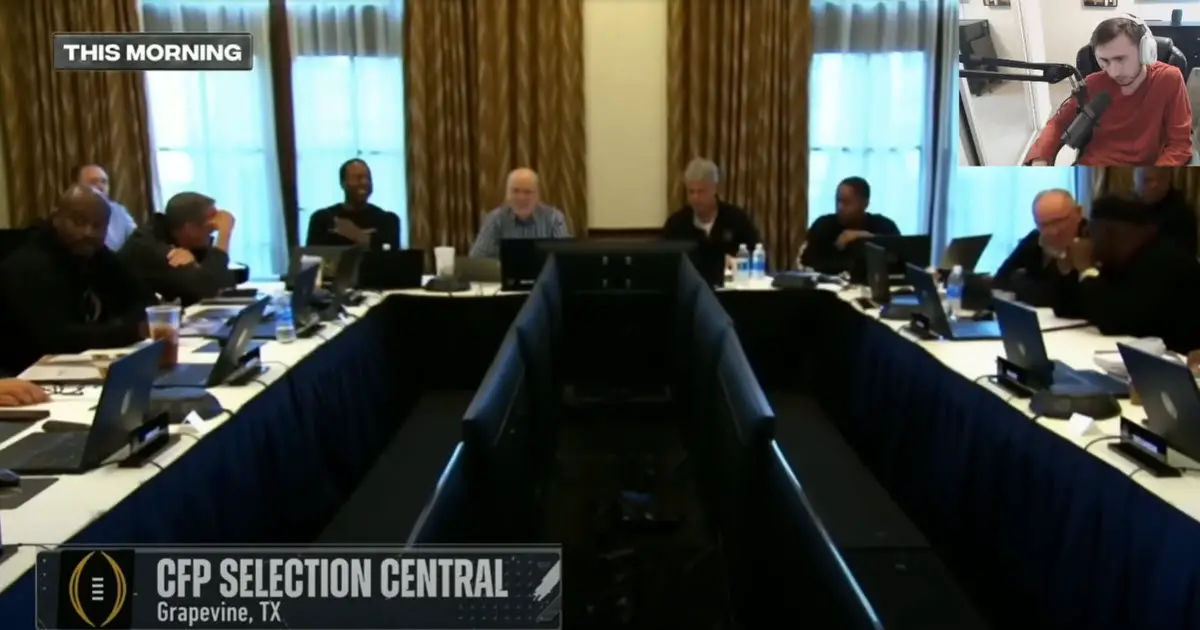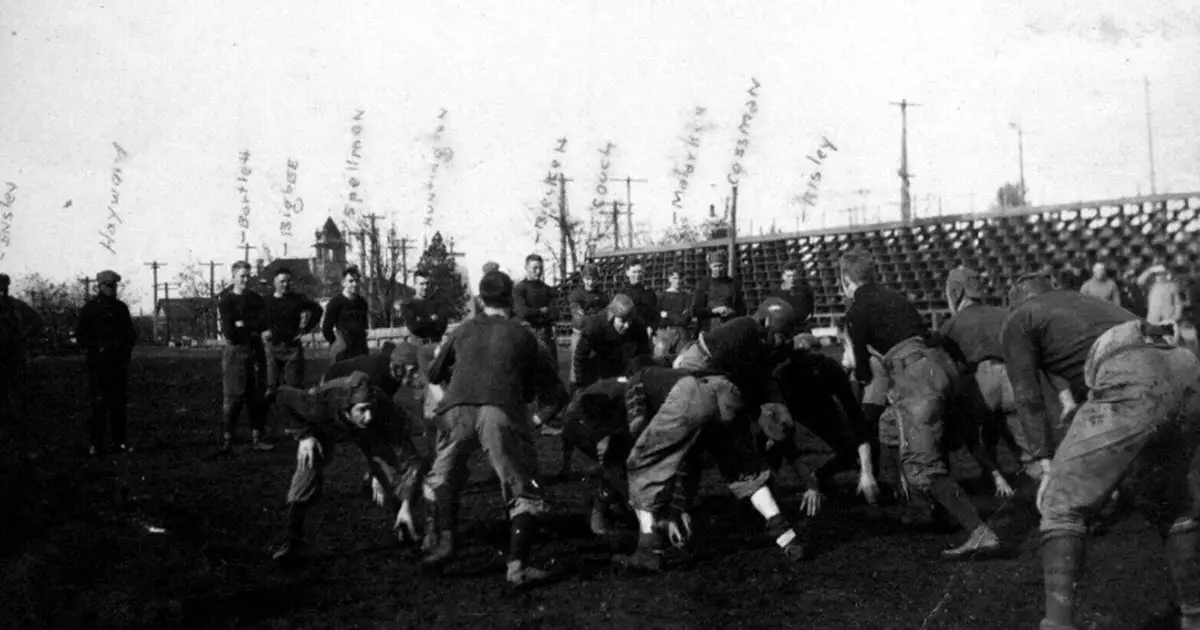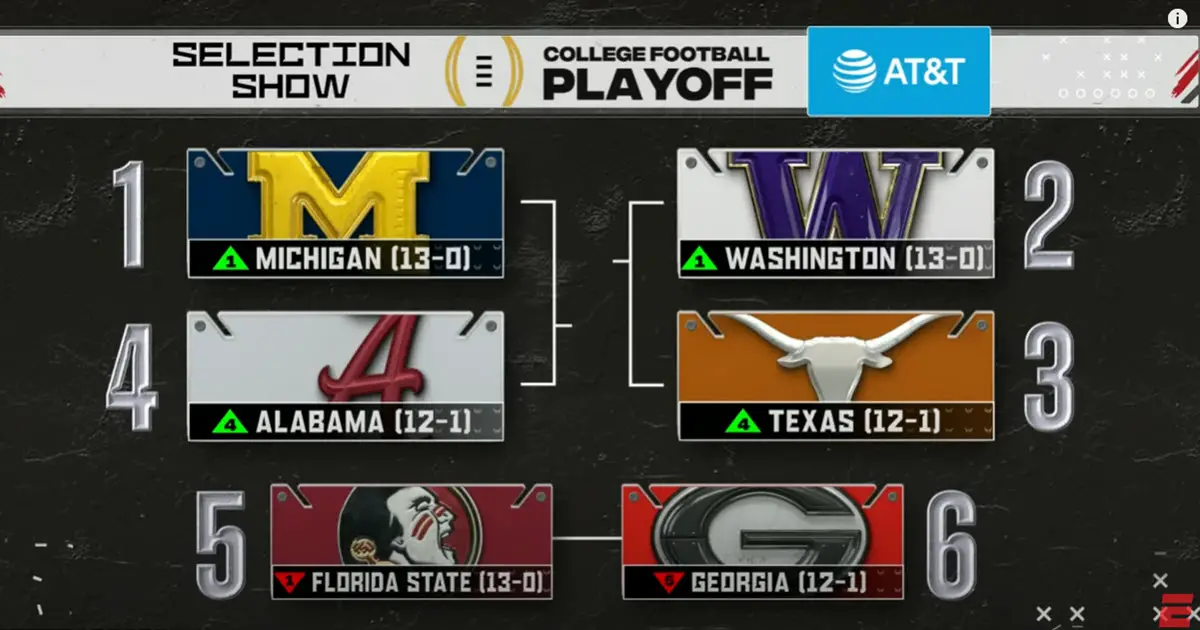The 2023 selection of four teams to compete for the title of College Football National Championship, and the included placement of eight teams into four New Year’s Bowl games has met with a cacophony of responses from football fans nationwide, a few of which responders are posters to our wonderful “forum with decorum.”
Vandownbytheriverduck says: “Thi$ committee is a joke. $o many options for better gains and games, for better TV, for better attendance, and for setting the hype for next year.”
And also: “These people are either corrupted by outside money or $imply idiots. Id [sic] check their ca$h positions. I bet these clown$ are on the take.”
JDuck asks: “Does the committee pick bowls?”
The press and even presidential candidates are seemingly angered by the committee leaving out Florida State:
USA Today headlines: “Committee snubbing unbeaten Florida State makes a mockery of College Football Playoff”
The New Your Times prints: “Florida State, 13-0, snubbed by College Football Playoff Committee”
Fox News says: “Trump blasts CFP officials after Florida State left out”
And, on a different cable news program I heard Florida Governor Ron DeSantis say that he was putting aside $1,000,000 to fund legal action on behalf of Florida State.
Sports Columnist John Canzano wrote on Monday: “It’s not a playoff. It never was. The College Football Playoff is a four-team invitational tournament.”
An in-depth look into just how the four playoff teams were chosen should shed some light into what some misconceive, and others question. Today we will cover the history of the naming of a National Champion in college football, and we will touch upon the controlling document for the College Football Playoff selection committee. The document that the selection committee relies upon in reaching its goal of choosing the four best teams.
In a future article we will address how the four playoff teams were chosen, and Florida State was excluded. We will also cover the placement of the Ducks in the Fiesta Bowl vs. Liberty, and the other New Year’s bowl placements by the committee will follow in another future article. But let’s look first at how National Champions have been determined in college football, and how it brought us to this moment.

2023 CFP Selection Committee. (Screenshot from ESPN Video)
The current “selector” of playoff teams, the College Football Playoff Committee (CFP), operates pursuant to an elaborate written protocol that was established in an attempt to take bias out of determining the college football champion of the year. The history leading up to the enactment of this protocol is long and filled with controversy about what team was the true National Champion. College football is the only sport where the NCAA does not sanction a championship playoff event.
In college football, NCAA Division I, the teams who have been awarded the championship, or who are chosen to play off in a championship game are designated by “selectors”. While the NCAA does not itself sanction an annual college football champion, it does maintain a record book and web site where all of the many selectors of a national champion and their often conflicting choices are recorded.
Selectors have been individual people, press organizations like the AP and UPI, and multiple self-appointed entities with a myriad of acronyms, such as NFP, NCF, HAF, CFRA and on and on. Even the former President of the United States, Richard Nixon, made a selection in 1969, by announcing, ahead of the season-ending “game of the century” between No. 1 Texas and No. 2 Arkansas, that the winner would receive a presidential plaque commemorating them as national champions.
The first national football championship was awarded for 1869, (that’s 154 years ago) to Princeton and Rutgers as co-champions. the two co-championship teams played each other twice, each wining one game, and there was no “playoff game” to declare one school the champion. At the outset, there was controversy.
The first award of a National Champion was made for that year, and nearly every other year through 1932, retroactively in 1934 by Park H. Davis, a college football historian. I am reasonably sure that Mr. Davis did not see either Princeton or Rutgers play in 1869, because he was not born until 1871. And, I suspect that the only players for Princeton and Rutgers who ever knew they were National Champions were those who lived to be at least age 85. Assuming they were age 18 when the game was played in 1869, they would have needed to live another 67 years until 1934 when Mr. Davis “selected” them to be the champion.

Hard to find records such as this of 1914 Oregon Football with famous names including Lyle Bigbee, Shy Huntington, Bill Hayward and John Beckett. (UO Library and Special Collections)
The point being that the National Championships awarded were, in the beginning, a speculation based on reading yellowed newspaper articles decades after the games were played. Possibly Mr. Davis interviewed some of the players in those early games. But he was a graduate of the school that he frequently named champion, Princeton, and was the coach for Lafayette the champion he named for 1896 when another selector chose Princeton. To say the least, the naming of a National Champion in college football has a history of being suspicious.
The NCAA has never sponsored a football National Championship competition. That there were many other “authorities” proclaiming a champion, lead to multiple champions in the same year. There were four “mythical” champions in the same year seven times, and three “mythical” champions in the same year six times. The “mythical” adjective came about because until the Bowl Championship Series (BCS) was instituted there was not an actual game played between No. 1 and No. 2 for the purpose of determining what team was the National Champion.
The absence of a designated playoff game was complicated by competing Bowl Games with contracts wherein certain conferences, like the BIG 10 and the PAC 8-12, made an agreement that their conference champion would play in the Granddaddy of them all. A vestige of that complication still remains in the FCS protocol today.
In 1998, the Bowl Championship Series (BCS) was created as a way to establish the national champion. The six major football conferences, ACC, Big East, Big Ten, Big-12, Pac-10, and SEC, agreed that they would rely upon a compilation of several different computer formulae combined with polls through press voting (the AP) and coaches’ voting (USA Today) to choose the top two teams in the country that would play off for the National Championship.
The six conferences convinced four major bowl committees, Rose, Sugar, Orange and Fiesta to buy into this game between the No. 1 and No. 2 teams as determined by the polls and computer selection methods. The game rotated among the four bowls from 1998 through 2013, and the two participants were chosen from the six conference champions plus one and sometimes two independent teams. What could possibly go wrong?
Wikipedia.org describes the problems:
In this selection process, the BCS was often criticized for conference favoritism, its inequality of access for teams in non-Automatic Qualifying (non-AQ) Conferences (most likely due to those teams having a lower perceived strength of schedule),] and perceived monopolistic, “profit-centered” motives.

The Alabama that played Georgia was different than the Tide that got by Auburn on a miracle. (Screenshot from CBS Sports Video)
The actual process of the BCS choosing the top two teams was, in several years, made nearly impossible by last game upsets and undefeated teams with zero losses but weak strength of schedule either getting into the championship game, or being left out.
Over the resistance of some conferences for many years, in 2014, an agreement was reached among the conferences to have a four-team playoff. The controlling document for how the four playoff teams are chosen is the CFP Selection Committee Protocol.
The protocol begins with the obvious: “Ranking football teams is an art, not a science.” In the same paragraph it acknowledges: “In any ranking system, perfection or consensus is not possible and the physical impact of the game on student athletes prevents elaborate playoff systems of multiple games.”
The statement about the physical impact of multiple games on student athletes was the major objection for a multiple playoff that led to the BCS. That statement was paraded out for years by some conferences to deny Division I college football a playoff system. And now when a 12-team playoff is in the offing for next year, the controlling document for determining the entrants to the four-team playoff this year continues its indecision about the impact of multiple games on student athletes.
Other than that, there is a lot of good thought supporting what the five-page protocol states about the team selection process. In a future article, we will engage the protocol language for selection of the top four teams and how they were chosen for this year.
I am of the belief that the correct four teams were chosen this year. I also feel that this part of college football, the determination of a National Champion, is on the right track. The 12-team playoff for 2024 will help quell the controversy. However, another statement at the outset of the protocol gives me pause: “Football is popular in some measure because the outcome of a game between reasonably matched teams is so often decided by emotional commitment, momentum, injuries and the ‘unexpected bounce of the ball.’ ”
No question, the playoff process has had its flaws. There always will be fans of the losing team in the final game who can say: “If only . . .”
Mike Whitty
Eugene, Oregon
Top Screenshot from ESPN Video

The senior Mike Whitty, age 84, is not the commissioner for Lane County football and basketball officials, as that is his son, Mike Whitty. A retired attorney, Mike Whitty, Sr., grew up in Coos Bay, and played football four years for Pete Susick at Marshfield High, during the time of the then Big “A” school’s three successive state championships, 1954-56.
A serious golfer, Mike has been the medalist in three divisions of the Oregon Coast Invitational at Astoria G & CC. He qualified and played in the USGA Sr. Amateur at Prairie Dunes, KS in 1995. His education: two years at USAF Academy, 1961-63. Oregon degrees, BS ’65, JD ’68.

